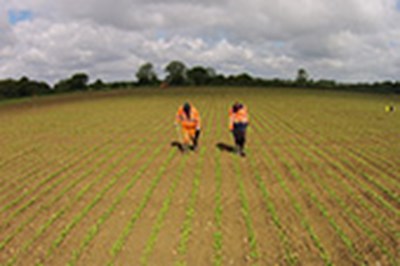Six new varieties of sugar beet have made it through stringent field trials to be accepted on the Recommended List 2018, managed by BBRO (British Beet Research Organisation) and BSPB (British Society of Plant Breeders). To make the grade the varieties have to be significantly better performing not just for yield but also for resilience to disease and bolting risk.
Mike May, chair of the RL Board, explains that the selection process is tough: “To earn a place on the Recommended List the new varieties have to perform well over three years of field trials.
“We are testing the genetics which means the conditions need to be as uniform as possible across the plots for both the newcomers and the controls. The sites are on farms run by some of our best growers so we can see how the varieties perform under field conditions.”
Six newcomers
Some varieties have been withdrawn from the list for 2018 and there are six new PR1 varieties: Bloodhound, BTS 3325, Daphna, Degas, Landon and Senada KWS. To be eligible for the RL the varieties must be on the National List, which is overseen by APHA, or the EU Common Catalogue by 1st March of the year before.
The Trials Technical Group (TTG) currently chaired by Daniel Godsmark of the BBRO, oversees the technical aspects of the trials, and the results are analysed by NIAB before being presented to a multi-stakeholder Crop Committee to make the final decision. The process is continually assessed this gives confidence to the breeders and grower base.
New format
This year all the data will be presented in a new format familiar to the industry to help interpretation of the results. To be considered for the RL the new variety must bring distinct characteristics, be uniform and stable in performance and offer value for cultivation and use. If it has a special trait, such as partial resistance to AYPR rhizomania, then it might make the grade even if the yield is not significantly better.
Bolter trials
Dr Simon Bowen, Knowledge Exchange and Crop Progression Lead of BBRO, is particularly interested in how the varieties perform in bolter trials. A cold period will bring on vernalisation (the production of flowers) which is undesirable, as the plant will produce seed instead of building sugar in the root.
Simon explains: “A long growing season will improve the yield and sugar concentration, but an early sowing increases the risk of bolting. The trials include a comparison between Early Sown Bolting (ESB) and Normal Sown Bolting (NSB) to see how a variety performs under severe conditions. The results mean that growers will be able to make an informed decision about the risk of bolting.”
Disease resistance
Disease resistance is also important and some of the new varieties have claims by the breeder that they are tolerant to BCN. However, the mechanism behind this is not known.
Dr Mark Stevens, Scientific & Crop Stability Lead at BBRO, explains: “Disease resistance to rust and powdery mildew is given a score based on percentage leaf infection. We have recently started conducting powdery mildew trials under controlled conditions to provide a reliable assessment of the plant’s resistance regardless of the disease risk for that season.
Colin MacEwan, Head of BBRO, says that improving the quality and consistency of the RL programme will continue to drive yield. “Having a strong list of varieties with background on how they perform year after year in the field will give growers the information they need to select the best varieties for their conditions. It will also be possible for them to benchmark their yields against crops grown under best practice. I believe the attention to detail given by the RL Board will continue to pay dividends in the future.”
Check out the varieties page for the 2018 list and further information
New varieties for 2018
Judged on percentage yield above the best three controls, bolting risk, tolerance to disease (where 9 is the highest resistance) and establishment before gapping to ~18 cm.
Bloodhound – entered with 100.8% above the control for adjusted yield, good on bolting and establishment. It has a disease score for rust of 3 and 4 for powdery mildew.
BTS 3325 - scored 103.0% adjusted yield above control, good pre-gap establishment, no problem with bolting. Scored 7 for rust and 5 for powdery mildew.
Daphna – adjusted yield 106.9% above control, suitable for early sowing, tolerant to BCN.
Degas – 102.0% above control for adjusted yield, chance of bolting, slightly weaker on disease.
Landon – has an adjusted yield performance of 104.7%. This variety scored 7 for rust and 4 for powdery mildew.
Senada KWS – yield performance is 105.6% above control, lower pre-gap establishment so a higher seed rate may be required.




